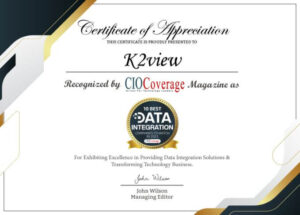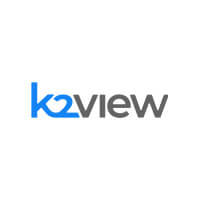 Today’s top companies – like Google, Netflix, Spotify, and Tesla – build their businesses around their data. They know that data makes them more innovative and responsive.
Today’s top companies – like Google, Netflix, Spotify, and Tesla – build their businesses around their data. They know that data makes them more innovative and responsive.
K2view believes that every firm should be able to leverage its data to become as disruptive and agile as the best in the business. This is especially applicable to the highly entrenched and regulated enterprises in finance, healthcare, retail, and telecom. These are customer-centric companies, where personalization is key to success. However, there’s a lot of data baggage that gets in the way – hundreds of systems, built and acquired over the years, using different technologies and architectures, with some on-prem, and some on cloud. As a result, change is difficult and slow for large organizations. But they must change, in order to survive, and, ultimately, thrive.
The company’s B2C customers (for example, AmEx, Charles Schwab, Sun Life, Verizon, IQVIA, and Vodafone) have been around for decades, and have been collecting information – on their customers, orders, products, and services – for just as long.
But their data is fragmented across many different systems, from legacy to cloud. To leverage it, it must be located, collected, cleansed, integrated, orchestrated, governed, and often masked or tokenized, to make it compliant with the latest privacy regulations. So, for most enterprises, dealing with data is always a mega-project.
K2view has identified 2 major data integration trends in enterprise data today:
- Maximizing speed and cost savings, through self-service data provisioning, citizen data engineering, cloud migrations, and legacy application modernization
- Treating data as a product, with emerging data mesh and data fabric architectures
The company addresses these trends through its Data Product Platform, which creates and manages a complete and compliant dataset for every business entity in the form of a data product – on demand, and in real time. The dataset is always in sync with its underlying sources, adapts to changes in the source structures, and is instantly accessible to any authorized data consumer. The data product includes the business entity data, and everything else that’s needed to deliver it.

The K2view platform provides data teams with a low-code/no-code framework for managing the entire data product lifecycle – design, engineering, testing, deployment, and ongoing change management. It fuels real-time operational use cases, including customer 360, test data management, cloud migration, legacy application modernization, and more – to deliver business outcomes in less than half the time, and at half the cost, of any other alternative.
It also inherently supports modern data architectures – data mesh, data fabric, and data hub – and deploys in cloud, on-prem, or hybrid environments.
K2 is considered the most difficult mountain to climb on Earth. But from the top, you can see just about everything. That’s the K2 view. We enable enterprises to gain that view using patented technology that organizes data in such a way that it can be seen, accessed, and provisioned for use instantly, Yuval Perlov, CTO at K2view.
K2view has the only data platform that creates, manages, and delivers data products at enterprise scale, and in real time – to make trusted data instantly accessible across the company.
Its Data Product Platform manages thousands of concurrent data products that continually sync, transform, mask, and serve trusted data through millions of Micro-Databases™ – one for each instance of a business entity. This patented technology allows data teams to define the data product (its entity and transformations) once, and use it for many workloads, at scale.
In summary, a Micro-Database is:
- Accessible in milliseconds
- In sync with underlying source systems
- Secured with its own 256-bit encryption key
- Compliant with data privacy and security regulations
- Cached, persisted, or virtualized, for optimal performance
- Trusted as the single source of truth for the business entity
The ideal case study for K2view is a Fortune 20 telco, which implemented Data Product Platform back in 2015. Today the platform supports multiple use cases, most notably:
- x360 – Delivers a complete view of any business entity (order, location, or device), with the platform managing hundreds of millions of such entities at the telco.
- Legacy application modernization – Migrates legacy systems to the cloud, enabling real-time data delivery via secure data services.
- Data privacy compliance – Masks, delivers, and purges customer data to ensure regulatory compliance, while minimizing the cost of compliance workflows and data processes.
- Test data management – Provides data teams with a self-service portal to instantly provision realistic test data subsets on demand – reducing test data provisioning time by more than 90%.
From a market perspective, K2view plans to expand its current focus on large, B2C enterprises to include mid-size companies in its key target markets.
From a product perspective, K2view is accelerating the pace of embedding AI into its platform, to provide customers with more automation and recommendations, increase data engineering productivity, and deliver better, smarter data products.






